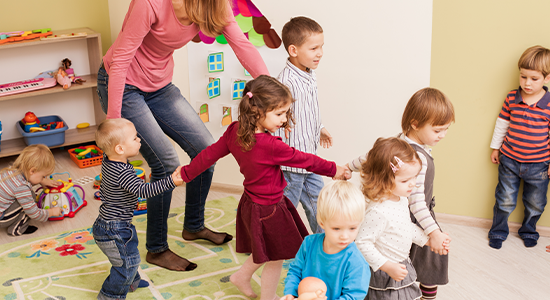Children’s emotion regulation in the daycare context

Spending the day in a daycare centre involves a lot of challenging situations for small children, challenges that sometimes evoke big emotions. Everyone who has ever been in a daycare centre knows that children have different ways of handling their big emotions and we know from research that children’s abilities to regulate emotions are important for their development and later well-being. But what characterizes adaptive emotion regulation in the toddler and preschool years? When can we talk about whether children’s emotion regulation strategies are maladaptive or underdeveloped? And last, but not least, how can we support children’s development of efficient and adaptive emotion regulation strategies in the daycare context?
Background
It is widely agreed that the ability to regulate emotions is important in many different aspects of a person's everyday life. Children’s emotion regulation abilities have been associated with peer-relationships, academic productivity and success, general well-being, optimism, and self-esteem. Aggression and difficulties following rules has been found to be associated with poor emotion regulation abilities. Furthermore, emotion dysregulation is a symptom in many psychopathological disorders, including autism, anxiety, eating disorders, and affective disorders.
Purpose of the project
The purpose of the project is:
- To investigate how emotion regulation strategies and emotion dysregulation has previously been assessed with systematic observational measures in 1-5-year-old children and to evaluate the psychometric quality of the measures.
- To evaluate the degree of similarity and difference between existing emotion regulation measures.
- To develop a pilot version of an observational measure for assessing children’s emotion regulation strategies and dysregulation in a Danish daycare context.
Method
A systematic review will be conducted to identify and evaluate the psychometric quality of existing observational measures for assessing emotion regulation strategies and dysregulation in 1-5-year-olds.
The development of an observational measure for assessing emotion regulation in the daycare context will be based on a Delphi study, qualitative interviews and item response theory analyses of observations that will be conducted as part of the project.
Contribution
There is a lot of research on emotion regulation but an overview of how to define and measure it is lacking. This PhD project aims to contribute to the field by providing an overview of observational emotion regulation measures and their psychometric properties. At the same time, the project aims to bridge the gap between research and practice by developing a pilot version of an observational instrument to use for systematic evaluation of emotion regulation in small children that is feasible to use in a daycare context.
About the project
Project period: 15 August 2023 - 14 August 2026.
PhD Student: Tina Wahl Haase
Supervisor: Mette Skovgaard Væver
Co-supervisor: Ida Egmose Pedersen
